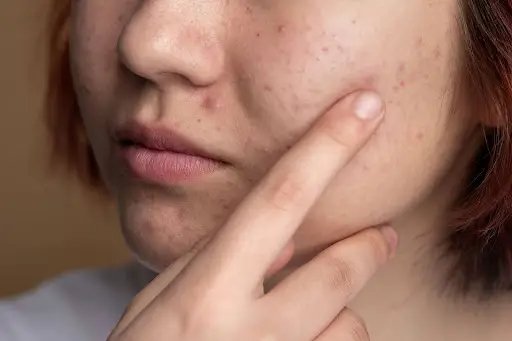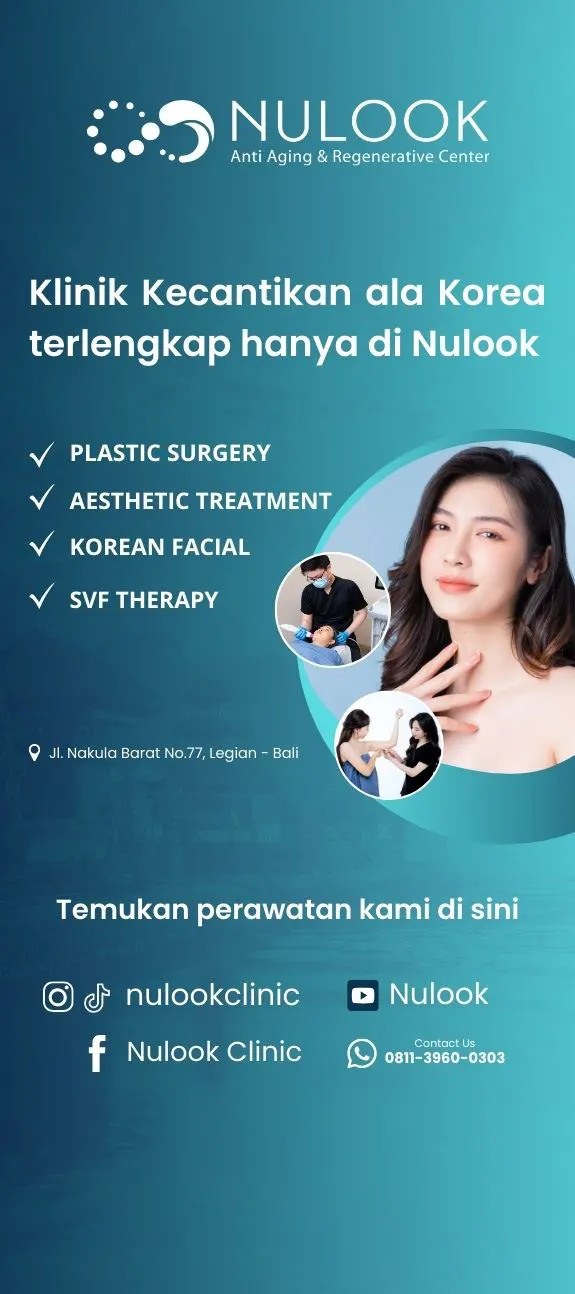9 Effective Ways to Treat Itchy Acne
Author: Nulook ExpertiseReview by: -Itchy acne is a problem that is not only annoying but can also worsen skin conditions if not handled properly. You have to be careful, Beauties! If left untreated, it can become bothersome and even increase the risk of difficult-to-remove acne scars. Therefore, it is crucial for you to understand how to treat itchy acne so that your skin can return to health and comfort.
Don't worry, because NuLook has summarized the steps you need to take to treat itchy acne. Here you will also learn about the causes of itchy acne so you can avoid this condition in the future.
Are you ready? Let's dive into the complete review below, Beauties!
Read Also: Benefits of Pico Laser: The Powerful Solution for Perfect Skin
9 Effective Ways to Treat Itchy Acne
Itchy acne can pose a unique challenge. If you experience itching in acne-prone areas, it is essential to alleviate it to prevent further inflammation.
Here are nine ways you can try to treat itchy acne and keep your skin comfortable:
1. Choose a Gentle Cleanser
Choosing the right cleanser is crucial for those with acne-prone skin. Avoid harsh facial cleansers or those containing alcohol, as they can dry out the skin and worsen acne conditions.
Opt for a gentle, fragrance-free, and non-comedogenic cleanser that won’t clog pores or cause irritation. Cleansers with ingredients like aloe vera or chamomile extract can also help soothe irritated skin.
2. Use Oil-Free Moisturizers
Dry and dehydrated skin can increase itching in acne. An oil-free moisturizer is the best choice, especially for those with oily or acne-prone skin.
Moisturizers containing hyaluronic acid or ceramides can maintain skin hydration without adding excess oil. Both ingredients also help repair the skin's protective barrier, making the skin feel calmer and well-hydrated.
3. Avoid Scratching Acne
Scratching or rubbing itchy acne will only worsen inflammation and can lead to swelling or infection. Instead, you can use a cold compress on the itchy area.
A cold compress will help reduce itching sensations and soothe the skin, making you less tempted to touch or scratch the acne.
4. Avoid Using Aggressive Products
Some acne products containing benzoyl peroxide or salicylic acid are effective in reducing acne but can make the skin drier and more sensitive. Try to reduce the frequency of using products with these ingredients, especially if your skin starts to feel itchy or shows signs of irritation.
Choose products with gentler ingredients or lower concentrations of active ingredients to be more skin-friendly.
5. Apply the Right Spot Treatment
If you want to use a spot treatment, choose one containing active ingredients like salicylic acid, sulfur, or tea tree oil, which can help reduce acne without excessively drying the skin.
However, make sure to apply these products only to the acne-affected areas. Applying spot treatment all over the face can strip moisture from the skin and cause irritation and itching.
6. Keep Hands and Face Clean
Touching your face with dirty hands can transfer dirt and bacteria to already acne-prone areas. This can worsen inflammation and increase itching.
Therefore, ensure your hands are always clean before touching your face or applying skincare products. Regularly washing your hands and keeping your facial skin clean are simple yet effective steps in preventing the spread of acne-causing bacteria.
7. Reduce Stress
Stress can worsen acne conditions and increase itching. An unstable psychological state triggers hormone production that can make acne more inflamed.
To reduce stress, try practicing relaxation techniques such as meditation, yoga, or simply taking time for enjoyable hobbies. With a calm mind, your skin will also become healthier, and the risk of developing acne will decrease.
8. Use Mild Corticosteroid Creams
In some cases, if itching is very bothersome, doctors may recommend mild corticosteroid creams. These creams are effective in reducing itching and inflammation in the skin.
However, the use of corticosteroid creams should be limited and only done under a doctor's guidance, as overuse can cause the skin to thin and result in other side effects.
9. Choose Products with Antioxidants
Antioxidants like vitamins C and E are highly beneficial for skin health. These ingredients help strengthen the skin's protective layer, reduce inflammation, and combat free radicals that can trigger acne.
You can choose serums or creams containing antioxidants for your daily skincare routine. Antioxidants also help accelerate skin recovery, making it healthier and brighter.
Read Also: 5 Types of Facial Lasers, Their Benefits, and Treatment Procedures
7 Causes of Itchy Acne to Watch Out For
Itchy acne is not only caused by regular irritation but can also be a sign of other contributing factors. Here are seven causes of itchy acne you need to be aware of:
1. Dry Skin
Dry skin is prone to irritation, including itchy acne. When the skin lacks moisture, its protective layer becomes more susceptible to damage, making acne itchier and more painful. It’s essential to keep your skin moisturized, even if you have oily skin, with oil-free moisturizers.
2. Reaction to Skincare Products
Some skincare products contain harsh chemicals, such as alcohol, fragrances, or certain preservatives, which can make the skin sensitive and itchy. Products unsuitable for your skin type can also trigger irritation and make acne feel itchier.
3. Bacterial Infection
Acne infected with bacteria can cause further inflammation leading to itching. Bacteria like Propionibacterium acnes thrive in clogged pores, causing painful and sometimes itchy acne. Keeping your face clean and avoiding the habit of touching your face can help prevent this infection.
4. Allergies to Cosmetic Ingredients
Allergic reactions to certain ingredients in cosmetics can also cause itchy acne. Substances like artificial dyes, fragrances, and chemical preservatives often trigger allergies in sensitive skin. If you experience itching after using a new product, stop using it immediately and see if your condition improves.
5. Exposure to Sweat and Pollution
Excessive sweating, especially after outdoor activities, can irritate acne-prone skin. Sweat contains salts that can worsen inflammation, especially when mixed with dirt or air pollution. Be sure to cleanse your face after activities to prevent sweat buildup on the skin.
6. Use of Active Acne Medications
Acne medications with active ingredients like salicylic acid, retinoids, or benzoyl peroxide are effective in treating acne but can dry out the skin and cause itching. If you experience itching after using these products, try to reduce the frequency or choose products with lower concentrations of active ingredients.
7. Stress and Psychological Conditions
Stress can trigger cortisol hormones that increase oil production in the skin and worsen acne. Itching can also appear as a physical reaction to unstable psychological conditions. Therefore, managing stress is an important step in skincare, including preventing itchy acne.
Read Also: 7 Effective Ways to Get Rid of Acne Scars and Their Causes
When to See a Doctor?
There are times when itchy acne cannot be handled with home treatments alone, especially if the symptoms worsen or do not improve. Here are some conditions indicating that you need to consult a doctor about itchy acne:
- Acne Accompanied by Severe Pain: If itchy acne also feels very painful and throbbing, it may be a sign that the acne has become infected or is experiencing severe inflammation. Consulting a dermatologist will help you get the right treatment to avoid complications.
- Widespread Swelling or Redness: If the area around itchy acne swells or experiences widespread redness, this may indicate that inflammation has spread. A doctor may prescribe anti-inflammatory medication or antibiotics to control inflammation and reduce the risk of further infection.
- Itching That Does Not Go Away with Self-Care: If acne remains itchy despite changing skincare products or following preventive steps, it is advisable to consult a doctor. This could indicate another skin condition requiring special medical treatment.
- Peeling or Burning Skin: Using products with certain active ingredients, such as retinoids or benzoyl peroxide, can sometimes cause the skin to peel or feel burned. If you experience this, consult a doctor to determine whether the dosage or type of product needs adjustment for your skin's safety.
- Drastic Increase in Acne Count: If itchy acne suddenly appears in large numbers on various areas of the face or body, this may indicate that you are experiencing a breakout due to allergic reactions or product incompatibility. A dermatologist will help identify the cause and provide suitable solutions.
- Acne Accompanied by Fever or Other Symptoms: If very itchy acne is accompanied by fever or other symptoms such as excessive fatigue, this may indicate an infection or a more serious health issue. In such cases, examination by a doctor is necessary to ensure there is no potentially dangerous infection.
- Increased Psychological Discomfort: If itchy acne makes you feel excessively anxious or stressed, it is best to consult a dermatologist. Appropriate treatment will not only address physical issues but also provide psychological comfort.
Dealing with itchy acne requires careful and precise treatment to prevent worsening conditions. By choosing suitable products, maintaining skin hydration, and avoiding triggering factors like stress, you can alleviate itching in acne and prevent further irritation. Remember not to scratch the acne and always keep your skin and hands clean to keep your skin healthy and free from acne problems.
Crystal Clear Facial NuLook, the Right Solution for Treating Itchy Acne
To address itchy acne and keep your skin healthy, the right treatment is essential. As the first Korean beauty clinic in Bali, NuLook offers skincare treatments with Korean beauty standards and techniques, including the chemical peeling salicylic acid from NuLook. This skincare procedure involves applying a specialized chemical solution to remove the outermost layer of skin.
This procedure is effective in promoting new skin cell growth and is commonly used to treat skin issues, including itchy acne. By using a chemical peel, you can improve skin texture affected by acne, reduce redness, and help fade acne scars.
For even better results, you can also try the crystal clear facial. This treatment is specially designed to deeply cleanse pores, reduce excess oil, and rejuvenate the skin.
Supported by experienced therapists, NuLook ensures that each treatment is performed professionally and comfortably, tailored to your skin’s needs. So, don’t hesitate, Beauties!
Visit NuLook now and enjoy an unforgettable skincare experience!
References:
- https://www.mulberryhouseclinic.co.uk/2024/07/09/the-itch-factor-managing-itchy-acne/
- https://gotobeauty.com/skin-care/is-your-acne-itchy-try-these-3-treatments/
- https://www.realsimple.com/itchy-acne-7373012


